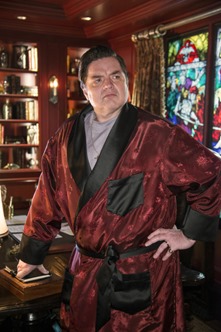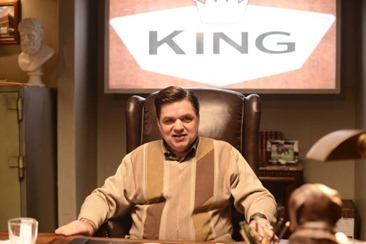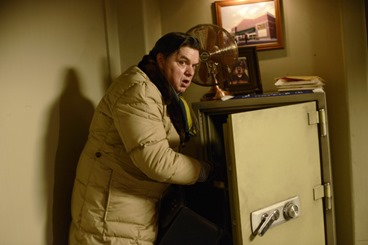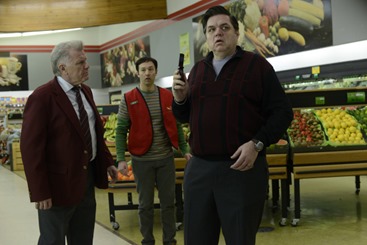Oliver Platt plays supermarket king, Stavros Milos on FX’s hit show, Fargo (Tuesdays, 10/9C). Recently he spoke with a group of journalists/bloggers about how Calgary’s coldest winter in twenty years helped keep things real on the shoot – and what it takes to play a character like Stavros, who has such a fascinating arc on the show.
Platt was thoughtful and measured in his responses to our questions and came across as polite, intelligent and focused – unlike his character.
Thank you for taking our call, Mr. Platt. Greetings from Minnesota. It’s always interesting to see Hollywood’s interpretation of how we live out here. My question is, this past week we learned about the ice scraper and the money that ties things together to the film, and I’m wondering how much of a back story were you given by Noah [Hawley] in order to prepare for your roll as Stavros?
Oliver Platt: You know, we developed this idea that he had come from Chicago with his family, and that he was just on hard times; a devout man on hard times who is given this “gift” if you will. That was pretty much it. The material, itself, is pretty alive. That was pretty much it.
When did you find out about the connection to the film?
Oliver: We got the episodes as they were written, and when I read it.
I’m calling on the behalf of my university. My college buddies and I like to create drinking games out of our favorite TV shows and films, especially the Coen Brothers, or worlds like this where things go from bad to being really bad. What do you think would need to happen, or shown on film—or the TV show for us to create a drinking game out of Fargo?
Oliver: Oh, gosh. I’m not sure that that’s something that I—I don’t know if I want to help you build a Fargo drinking game, to be truthful. You could certainly key it off certain phrases is the first idea that comes to mind.
Yes.
Oliver: I don’t know. Every time somebody says, “Aw, geez.” Anyway, that’s going to be my contribution to your drinking game.
You shot here in Calgary and Alberta, it was actually the coldest winter in 20 years, apparently. What were your experiences like here, and how did it help with your performance?
Oliver: Well, it was funny. It was very, very cold when I was there, but then we also—there was a little bit of the chinook, too—
Eric: Right.
Oliver: —but apparently the chinook wasn’t visiting with the frequency that it usually did. There’s a scene that takes place in Episode 6 that—it was pretty intense, and we were in, I think, ten degree below weather doing this stuff over and over again. What can I tell you? It helps. It’s like in terms of you’re putting yourself in the position of what the character’s going through with Mother Nature giving you a huge assist. The landscape—it’s a very, very well chosen location in terms of feeding that sense of the expanse and sort of the desolation and maybe the loneliness of those people.
First of all, did you have any right of first refusal or any input on anything on the guy you got to play the young you, and how close was he?
Oliver: I thought they did a sensational piece of casting there myself. I was really surprised, and I thought that it was—clearly they had that crossfade in mind, and if you’re going to sell that there better be some architectural similarity there, you know? I thought he was marvelous, I really did.
You’re looking at him and, as you said, the flashing ahead to your character. Is the challenge of this guy, or maybe the challenge as an actor—because this guy was so used to being in control, like he was out of control when he was young then he spent most of his adult life in control, and I guess, is the fear of it now that it’s spinning out of control for him again? Is that the challenge to play as an actor?
Oliver: Absolutely or, rather, the fun of it. Not knowing why—
Right.
Oliver: —his head has been so successfully messed with, so artfully screwed with, and it’s just a delicious sort of menu of obstacles for an actor to—is it God, is it my ex—who could possibly be doing, or orchestrating these things. On top of that, the way they’re messing with…the way his medication has been messed with so that the way he’s perceiving it is—orchestration actually isn’t a bad word to describe the whammy that Billy Bob [Thornton’s character Lorne Malvo] put on me.
I’m a big fan of yours ever since Huff. I loved that show.
Oliver: Thank you very much.
I was wondering, when you did the scene with all of the crickets, was that all CGI or did you have to contend with real-life insects?
Oliver: It was a pleasant mix. There were inanimate crickets, there were animate crickets, and then there were imaginary crickets. It was one of those classic green screen situations where you sort of—yet, with a lot of motion to it, too. It was a lot of fun to shoot, it was a lot of fun to shoot, and I thought that the way the concentric circles of chaos that were created in the market, itself, was delightfully realized.
It certainly came over well. It all went very smoothly as planned, and no problems with all that?
Oliver: Yes. I think that so much of this stuff can be sort of laced in, in post. I don’t remember doing a tremendous amount of takes.
We’re seeing your IMDb page, and you did TV when you were younger in the ages starting out, then you didn’t do TV in the ‘90s, then you got back on TV in the ‘00s. What are your feelings on how TV has evolved on this show, in particular, because it’s an anthology series and I reckon that it’s easier to commit to it as an actor than to commit to a bigger role in a network television series or something like that.
Oliver: Yes, it’s ultimately all about the writing, and—I’m sorry, can you rephrase your question?
Okay. How do you see the evolution of television from when you started to when you were a guest on Miami Vice [indiscernible]?
Oliver: [indiscernible] depending on who you talk to we’re in either the second or third golden age of American television, and the advent of the limited miniseries, as you observe, a marvelous thing for actors because, as you said, you don’t have to sign your life away. It’s also allowing television to do what really only television can do, which is novelize a—use the format, the serialized format, to tell us a story over a period of time and really get under the character’s skin. Television’s going strong.
You were saying that the writing is so alive on this show. Do you think that the stuff you were looking at in the ages was written with less detail, maybe?
Oliver: Yes, certainly. Network television was very, very different and, again, it was about having closed episodes. Like I say, the fun part is to take part in a story that’s unfolding. People walk up to you on the street and they grab you by the lapels and they say, what’s going to happen next?
Thank you so much for joining this call. Of course, my dog decides it’s the moment to bark [indiscernible] sorry.
Oliver: Oh, dear. I know the feeling.
I just wanted to say, I’ve been a fan of yours since I saw you on Gun Shy. I absolutely love that movie.
Oliver: Oh, thank you.
Sure. You started to talk a little bit about the writing, but can you talk more about what attracted you to the role, and why you decided to take it?
Oliver: Just such a muscular arc, you know? One of the first things you’re looking at is, where does the guy start and where does he end and how do they get him there? That’s what we yearn for as actors, is that sort of distance to travel, and Noah laid that out in spades. It was a story that took this guy and took everything that he believed in and turned it on its head, and he didn’t know who it was, who was doing it to him even though he had his—and that’s the brilliance of the scheme, is the ninja mind tricks.
I was wondering, did you have any trepidation at all about starring in a show that’s based on a movie that’s so critically acclaimed that people still hold so dearly to their hearts?
Oliver: The answer is, absolutely. The stuff that I was shown, the story that I was told, the fact that Joel and Ethan [Coen] had blessed it was not insignificant. I have to say, I think that Noah’s done a pretty remarkable job of sort of threading that needle of writing in their tone, but sort of—he had his own voice, if you will and, to me, it’s pretty impressive stuff.
You mentioned a few minutes ago that some people are claiming we’re in a golden age of TV, but I wasn’t clear if you agree with that. I’m wondering if you do and, if so, what would be some of the top shows that you either like to watch or that you think personify this golden age?
Oliver: I absolutely agree with that. One of the shows that I’ve been watching, I like to watch—obviously Breaking Bad, and there’s that classic—Breaking Bad. I’ve been watching The Americans, the second season of which has been pretty sensational, I think; I’ve been watching—I’m blanking here a tiny bit. I absolutely feel that we’re living in a, again, depending on who you talk to, a renaissance of—
Do you think that’s on cable, specifically, or would you say it also extends to broadcast?
Oliver: I think that cable creates the environment that’s most friendly to it for obvious reasons because of the obsession with serialization, or rather of syndication is not really there. I’m trying to come up with a couple other shows for you, though.
I appreciate that.
Oliver: Anyway—
It’s not supposed to be a test, so I think you for your time this morning.
Oliver: You bet.
My question for you is, we see Stavros go from being this broken man, who believes God just showed a great gift to him to becoming someone who’s kind of almost mad with power and calling himself a king. How do you think Stavros evolves into the man he is when Malvo comes into his life?
Oliver: I’m sorry, could you ask the question again?
Sure. I was just saying, we see Stavros kind of go from being sort of broken, and he believes God gave him this money, and then to who he is now, this man who has so much power, and he’s even calling himself the king. How do you think he evolved into the man he is when Malvo comes into his life?
Oliver: Well, he built this extraordinary supermarket empire, and he’s been very, very focused on the externals. You get the sense that Malvo detects a certain amount of…there, and he just has a nose for that kind of thing. He’s all about how everything’s looking. Obviously he doesn’t really feel he deserves it, which is probably why he’s on some level… which is why he’s so focused on the theatricality of it all. I think that that’s where we are when Malvo shows up.
Are we going to see things continue to escalate with Malvo sort of torturing Stavros as the show goes on?
Oliver: Indeed you are.
What do you think it is about Fargo that’s made it such a fast fan favorite?
Oliver: You know, I think it’s a combination of the storytelling and the style. There’s something so compelling about exploring the menace and the loneliness beneath that culture; the people that ostensibly are incredibly polite, button down way of—the way that people relate to each other on a superficial level. I think that there’s a fascination to that, and then the fact that if good writing is compelling sequences of events then Noah’s really got that nailed.
Noah Hawley recently referred to your character as a typical Coen blustery autocrat with a very inflated sense of self, and he used some examples; Nathan Arizona, from Raising Arizona and the Big Lebowski character from the Big Lebowski. Given that the Coen Brothers, their humor, the way they use humor is very unique, did that effect your performance, or did you let it all come from the writing; like your timing and things like that?
Oliver: Yes, that’s usually the way you want to go about it, is to let the writing tell you, inform your own sense of—guide your own sense of rhythm, and it’s very much in there. Yes. In the best case scenario you can’t see the joke. You know what I mean? It’s just arising organically out of what the conflict that’s been created between the people in the scene, and the way the guy regards himself and all this stuff. It’s happening on a lot of different levels, and you just get on the horse and you ride.
You have said in other interviews that your family has kind of changed the way you approach certain jobs; you’ve focused less on theatre over the years. You have an amazing body of work, and I’m wondering, what is it that you still find the challenges or the entertainment of doing this, or is it more of a job for you? Do you still feel like you did when you first started, that thrill of doing this given that you’re doing a job where it’s negative degrees for most of the filming? What do you find that still brings the passion to you?
Oliver: You know, that’s a really great question. I consider myself blessed that I—I just get a kick out of figuring out what it is. The thing is, I’m just interested by the next thing that comes along that’s probably—hopefully a little bit different than something I just did, but it’s a mysterious—the attraction is mysterious, and I don’t necessarily understand it; I’m not sure I want to, but it’s just something that I get a kick out of doing. I consider myself lucky to continue to get opportunities to do it.
Your character is sort of an a-hole. I’ve been watching you for decades, and I’ve been hearing you talk now and you don’t seem like an a-hole. How do you approach playing an a-hole?
Oliver: Well, the first key is that you don’t look at the person that way, you look at the person, you say, how does he think he’s helping, how does he think he’s making the world better. You catch an actor judging the character that they’re playing, and it’s not terribly interesting. Much more importantly, I think that Noah appreciates those aspects of Stavros, too. He has that perspective, and it’s something that we talked about.
It’s an amazing character name; Stavros Milos. His name is a brilliant name, don’t you think so?
Oliver: Tell me how you think.
I think it’s a great-sounding name, it’s like it’s catchy.
Oliver: Oh, just phonetically?
Phonetically, and it’s imposing. I think so.
Oliver: Yes.
If I heard of the—it’s the name of king.
Oliver: Aptly named.
I was wondering if you could tell us, do we ever find out where that mysterious money came from?
Oliver: I’m not sure.
Okay. I understand. I hope the character comes to a good end because I have a bad feeling, but then again, it’s that kind of show.
Oliver: It certainly is.
Do you have a favorite scene that you can talk about from, I guess, what’s aired so far so you don’t spoil anything?
Oliver: Excuse me. Favorite scenes. The fact that I’m having a hard time answering the question is a good sign, I think. I’m sort of taking it all in. What’s your favorite scene?
I think I like when your character kind of goes crazy when he starts taking the wrong medicine.
Oliver: Right. You know, that’s a powerful, very entertaining plot device there.
Photos by Chris Large/Courtesy of FX



